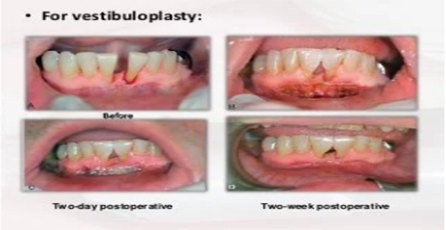Diode Laser for Vestibuloplasty in Dental Surgery
A normal vestibule aids in proper plaque control and contributes to a good oral hygiene. In certain instances, like, an anatomical variation such as higher insertion of the muscle attachments of vestibular mentalis and other associated muscles, leads to a decrease in the vestibular depth. To make matters worse, an insufficiently keratinized gingiva, which is a critical component for the maintenance of periodontal health, aggravate the disease. Inadequate vestibular depth results in poor plaque control owing to an insufficient width of keratinized gingiva.
Vestibuloplasty provides the necessary vestibular depth and can be performed either with a scalpel, electrocautery or lasers. The advent of new technologies with the introduction of lasers in dentistry have enabled practitioners to use various types of lasers (diode laser, Er.YAG, Nd.YAG) for vestibuloplasty procedures.
Compromises esthetics Vestibuloplasty is defined as the surgical modification of the gingiva-mucous membrane relationships, including deepening of the vestibular trough, altering the position of the frenulum or muscle attachments, and widening of the zone of attached gingiva. Other names of Vestibuloplasty include Sulculoplasty, Sulcus deepening procedure, Vestibular extension procedure, & Sulcus extension technique. Vestibuloplasty is indicated to halt the progression of gingival recession, to regain the width of attached gingiva, for effective plaque control procedures, better esthetics, to improve denture retention and stability, and to prevent inflammatory alterations and tissue recession around implants.
Traditional scalpel method is still the gold standard for vestibuloplasty, but it can cause discomfort to the patient. Patients treated with scalpel vestibuloplasty technique often had increased post-operative pain and bleeding, during the surgical procedure. In order to avoid these problems, soft tissue lasers hold a promising role in the field of dentistry. Advantages of lasers over scalpel includes, no or minimal requirement of anaesthesia, a bloodless surgical field that will provide increased visibility to the operator, no requirement of sutures, tissue surface sterilization, less post-operative pain and a good healing response.
Laser vestibuloplasty with the Diode laser represents a contemporary non-invasive alternative to conventional scalpel method. 980nm soft tissue laser was used to minimize the patient discomfort. Laser also enhances wound healing and reduces scar formation. Diode lasers with an effective penetration depth of 2mm in the tissues seal the small lymphatic vessels minimizing edema post surgically. The postoperative period was uneventful, without pain or signs of infection. This increased vestibular depth enables the patient to perform adequate plaque control thus it reducing the incidence of periodontal diseases.
